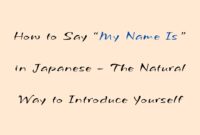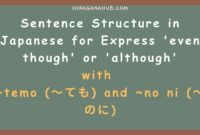Changing Verbs to Past Negative Form
Hello, Japanese learners! Today, we will discuss how to transform Japanese
verbs into the past negative form. Don’t worry, it’s quite simple! We just
need to combine the negative form with the past form. Before we begin, make
sure you understand the classification of Japanese verbs, as each group
follows a different rule.

Group 1: Godan Verbs (ごだんどうし)
For Godan verbs, replace the final u sound
with a, then add nakatta (なかった) at the
end. For example, hanasu (はなす) (to speak) changes to
hanasanakatta (はなさなかった).
However, verbs ending in u (う) are an exception. In this
case, replace u with wa (わ) before adding
nakatta. Example: kau (かう) (to buy)
becomes kawanakatta (かわなかった).
Here are some examples of Godan verbs changing to the past negative form:
-
つかう (tsukau) → つかわなかった (tsukawanakatta): Did not
use -
はなす (hanasu) → はなさなかった (hanasanakatta): Did not
speak - まつ (matsu) → またなかった (matanakatta): Did not wait
-
いそぐ (isogu) → いそがなかった (isoganakatta): Did not
hurry - しぬ (shinu) → しななかった (shinanakatta): Did not die
- かく (kaku) → かかなかった (kakanakatta): Did not write
- のむ (nomu) → のまなかった (nomanakatta): Did not drink
- しる (shiru) → しらなかった (shiranakatta): Did not know
- とぶ (tobu) → とばなかった (tobanakatta): Did not fly
Example sentence:
-
きょうは てすとが あるの? へえ、わたし、しらなかった
(Kyou wa tesuto ga aru no? Hee, watashi, shiranakatta)
There’s a test today? Oh, I didn’t know.
Group 2: Ichidan Verbs (いちだんどうし)
For Ichidan verbs, simply replace
ru (る) with nakatta (なかった). This rule
applies to all Ichidan verbs.
- たべる (taberu) → たべなかった (tabenakatta): Did not eat
- みる (miru) → みなかった (minakatta): Did not see
-
きこえる (kikoeru) → きこえなかった (kikoenakatta): Was not
heard - みえる (mieru) → みえなかった (mienakatta): Was not visible
- でる (deru) → でなかった (denakatta): Did not go out
-
できる (dekiru) → できなかった (dekinakatta): Was not able
to
Example sentence:
-
けさ、わたし あさごはんを たべなかった
(Kesa, watashi
wa asagohan o tabenakatta)
This morning, I didn’t have breakfast.
Group 3: Irregular Verbs (ふきそくどうし)
Japanese has only two irregular verbs, so they are easy to
memorize.
- する (suru) → しなかった (shinakatta): Did not do
- くる (kuru) → こなかった (konakatta): Did not come
Example sentence:
-
きのうの よる、ぱーてぃーに こなかった
(Kinou no yoru,
paatii ni konakatta)
Last night, I didn’t come to the party.
Summary Table: Past Negative Verb Conjugation
Here’s a quick reference table to help you remember the changes:
| Positive Verb | Past Negative Verb |
|---|---|
| Godan Verbs (Group 1) | |
| かう (kau) | かわなかった (kawanakatta) |
| しる (shiru) | しらなかった (shiranakatta) |
| かつ (katsu) | かたなかった (katanakatta) |
| かく (kaku) | かかなかった (kakanakatta) |
| およぐ (oyogu) | およがなかった (oyoganakatta) |
| のむ (nomu) | のまなかった (nomanakatta) |
| しぬ (shinu) | しななかった (shinanakatta) |
| とぶ (tobu) | とばなかった (tobanakatta) |
| はなす (hanasu) | はなさなかった (hanasanakatta) |
| Ichidan Verbs (Group 2) | |
| たべる (taberu) | たべなかった (tabenakatta) |
| みる (miru) | みなかった (minakatta) |
| Irregular Verbs (Group 3) | |
| する (suru) | しなかった (shinakatta) |
| くる (kuru) | こなかった (konakatta) |
Now you know how to change Japanese verbs into the past negative form! I hope
this lesson is useful and easy to understand. If anything is unclear, don’t
hesitate to drop your questions below! Also, feel free to share this lesson
with your fellow Japanese learners. See you in the next study session, and
thanks for stopping by!


